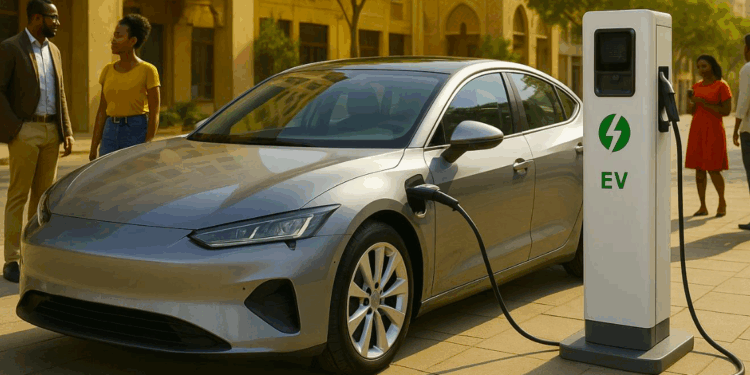Tanzania is officially putting its money where its mouth is regarding the electric vehicle (EV) revolution. In a major move to accelerate the adoption of cleaner transport, the government has confirmed excise duty exemptions on Electric Vehicles (EVs), significantly lowering the total cost of ownership for both private buyers and commercial fleets.
This move, anchored in recent amendments to the national financial legislation, provides the clearest signal yet that e-mobility is now a core part of Tanzania’s economic and environmental strategy. For consumers, this translates directly into more affordable upfront prices for electric cars, motorcycles, and three-wheelers, making the switch from Internal Combustion Engine (ICE) vehicles more compelling than ever before.
The Financial Breakdown: How Tax Waivers Drive Down EV Costs
Previously, the high upfront cost of importing an EV was a major deterrent for many Tanzanian buyers. While EVs benefit from lower running costs (electricity is drastically cheaper than petrol), the combined weight of import duty, VAT, and excise duty made the initial purchase price prohibitive.
The new policy directly targets one of these major hurdles:
| Tax Component | Previous Status (ICE/General) | New Status (Qualifying EVs) | Impact |
| Excise Duty (Non-Utility EVs) | Varies based on engine size/age (Up to 10%+) | Fully Exempted (0%) | Massive reduction in final price, directly closing the price gap with ICE vehicles. |
| Import Duty | 25% of Dutiable Value | Still applies (25%) | Maintains a level playing field, but the overall tax burden is reduced. |
| VAT | 20% of Dutiable Value + Import Duty | Still applies (20%) | The base for VAT is now lower due to the zero excise duty. |
The Big Win: By eliminating excise duty, the government has created an unmistakable fiscal advantage for electric cars, which now face a total tax rate that is noticeably lower than that of comparable gasoline or diesel vehicles. This ensures that the long-term savings on fuel and maintenance are now easier to realize from day one.
Read more here: A deep dive into the total cost of ownership (TCO) for EVs versus petrol cars in Dar es Salaam is available on automag.tz.
Beyond the Price Tag: Tanzania’s E-Mobility Vision
The exemption of excise duty is more than a simple tax cut; it’s a strategic economic lever designed to achieve several national objectives:
1. Energy Independence
Every EV purchased reduces Tanzania’s reliance on imported fossil fuels. With the national grid increasingly being bolstered by renewable sources like hydropower (e.g., the Julius Nyerere Hydropower Plant), shifting transport to electricity improves national energy security and saves foreign currency.
2. Tackling Air Quality
Major urban centers, especially Dar es Salaam, suffer from air quality issues largely due to traffic emissions. Encouraging the use of zero-tailpipe-emission vehicles directly leads to cleaner air and better public health outcomes in crowded areas.
3. Fostering Local Industry
Incentives like this pave the way for local players to invest in assembly and manufacturing.The local assembly of vehicles, such as the confirmed plan for Tembo Electric Utility Vehicles, becomes far more economically viable when government policy supports the final product’s affordability.
Car Care Tip: Understanding EV Range and Charging
For first-time EV owners, range anxiety is a common initial concern. However, with Tanzania’s charging network slowly but steadily expanding in major cities, a simple rule of thumb can save you headaches:
- Tip: The 80/20 Rule for Daily Driving: For daily commutes and local trips, treat your EV battery like your phone battery: keep it charged between 20% and 80%. This practice preserves the battery’s health over its lifetime. Only charge to 100% when you are planning an immediate long-distance trip. This small behavioral change ensures your expensive battery pack stays healthy for years to come.
Finding Your Electric Ride: What’s Available?
The removal of excise duty will open the market to a wider variety of models, pushing down prices on both new and used EVs. Affordable options like the Nissan Leaf, BYD Dolphin, and smaller electric two- and three-wheelers are becoming increasingly attractive.
If you are a buyer, this is a great time to evaluate your options. To find second-hand cars suitable for these conditions, from reliable Japanese imports to emerging electric models, check out the listings on auto24.tz. The market for older, used conventional cars may shrink due to new age and emission-related charges, pushing value towards the cleaner alternatives.
For drivers looking to explore sustainable mobility, EV24.africa offers import options for electric cars, expanding choices in the mid-range and premium segments that benefit most from the significant tax savings.
The message is clear: Tanzania is committed to an electric future. For consumers and businesses alike, the financial case for switching has never been stronger.




